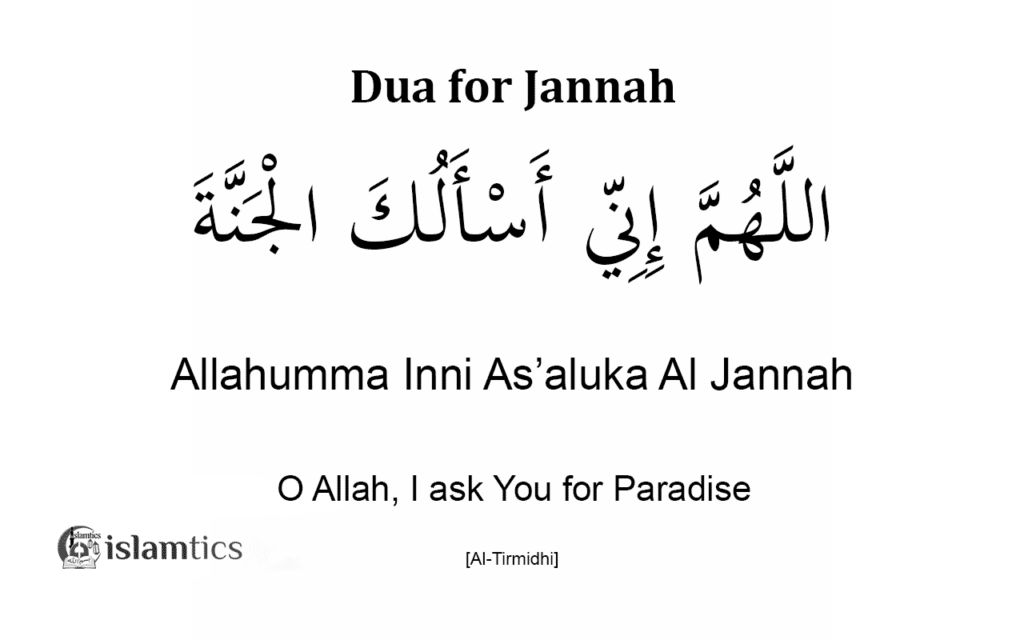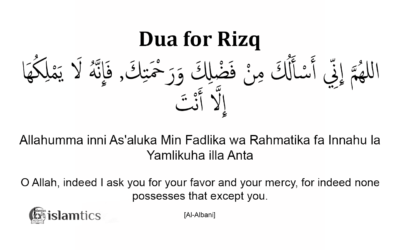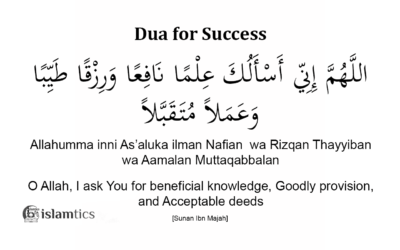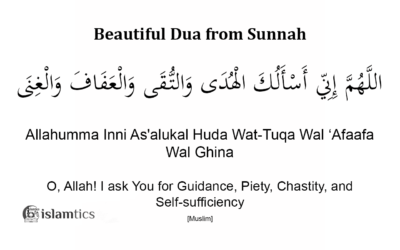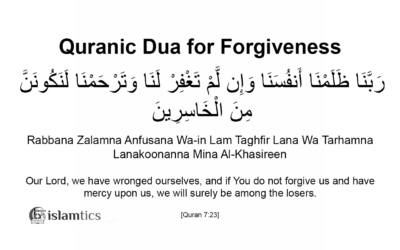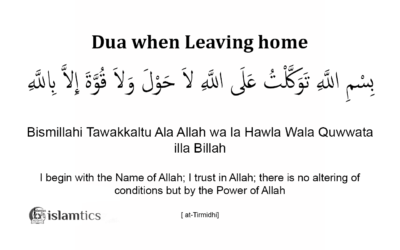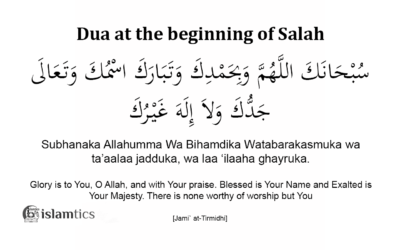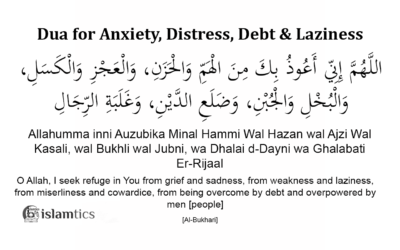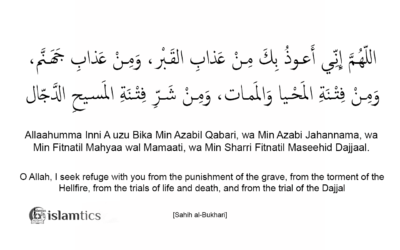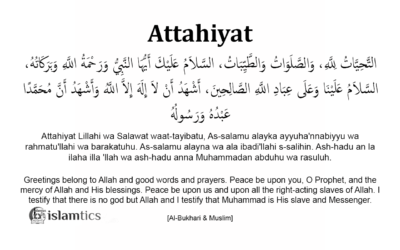Allahumma Inni As’aluka Al Jannah is a short yet powerful Dua for asking Allah for Jannah. Our prophet Muhammed (ﷺ) told us that Whoever asks Allah for Jannah three times, Paradise would Ask Allah to admit him to enter Jannah.
Table of Contents
Pronunciation
The following video we have made will help you learn the proper pronunciation of the Dua word by word:
Allahumma Inni As’aluka Al Jannah in Arabic
The full Dua is written in Arabic with the Diacritical as:
Transliteration
Allahumma Inni As’aluka Al Jannah Meaning
The General meaning of the dua is simple and straightforward: “O Allah, I ask You for Paradise“. It is a humble request made to Allah, asking for entry into Paradise, which is the ultimate reward and end goal for any muslim.
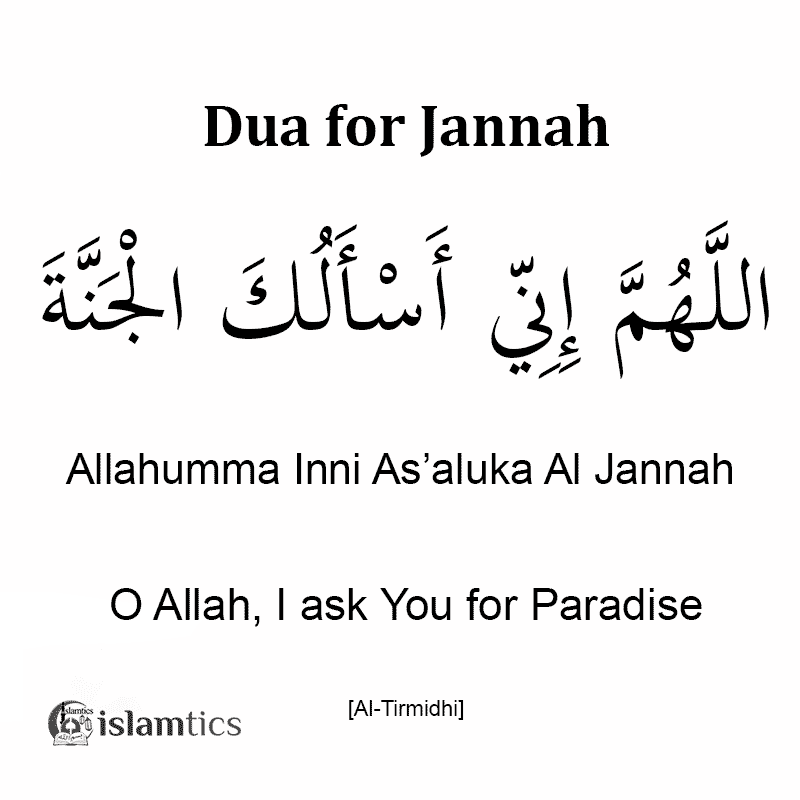
Dua Benefits
The dua provides plenty of benefits as it will provide the things that this supplication is asking for which are
- The Dua is very powerful as the beloved Prophet (ﷺ) taught us that Whoever asks Allah (s.w.t) Paradise three times, Paradise says: ‘O Allah, admit him into Paradise,
- Creating a Strong Desire for Jannah: Reciting this dua expresses a sincere desire for Jannah. This reaffirms one’s belief in the afterlife, the reward of Paradise, and the importance of striving for righteousness and obedience to Allah.
- A reminder of the Ultimate Goal: By Reciting this dua, it serves as a reminder of the ultimate goal in life, which is attaining Jannah and the pleasure of Allah. It helps to refocus one’s priorities, motivating one to engage in good deeds, avoid sins, and strive for righteousness.
- Seeking Allah’s Mercy and Forgiveness: When asking Allah for Paradise, one affirms their need for Allah’s mercy, forgiveness, and guidance. It reflects a recognition of one’s shortcomings and a sincere plea for Allah’s grace and favor.
- Strengthening Faith and Hope: The act of supplicating for Paradise strengthens one’s faith and hope in the mercy and rewards of Allah. It instills a sense of optimism and anticipation for the promised blessings and eternal bliss that await believers in the hereafter.
- Increased Motivation for Good Deeds: Reciting it can serve as a motivation to engage in acts of worship, righteousness, and kindness. The desire for Paradise inspires believers to strive harder in their Islamic practices, charitable acts, and interactions with others
24 ways to enter Jannah
1. Whoever meets Allah without ascribing anything to Him will enter Jannah. [Bukhari]
2. Whoever believes (has Iman) in Allah and His Messenger (ﷺ), and establishes the prayer and fasts during the month of Ramadan, it is incumbent upon Allah that He enters him in Jannah. [Bukhari]
3. Whoever builds a Masjid seeking by it the Pleasure of Allah, Allah will build a similar place in Jannah for him. [Bukhari]
4. Whoever prays the two cool prayers (Asr and Fajr) will enter Jannah. [Bukhari]
5. Whoever goes to the Masjid (every) morning and in the afternoon (for the congregational prayer), Allah will prepare for him an honorable place in Jannah with good hospitality for (what he has done) every morning and afternoon going. [Bukhari]
6. Whoever can guarantee (the chastity of) what is between his two jaw-bones and what is between his two legs (i.e. his tongue and his private parts), I guarantee Jannah for him. [Bukhari]
7. Whoever prays 12 Rak’ah in the day and night, a house in Jannah will be built for him. [Muslim]
8. Whoever treads a path in search of knowledge, Allah will make easy for him the path to Jannah. [Muslim]
9. Whoever repeats after the Mu’adthin (the caller to prayer) from his heart (i.e., sincerely) will enter Jannah. [Abu Dawud]
10. There is not one of you who perfects his Wudu and prays two Rak’ah setting about them with his heart as well as his face except that Jannah would be mandatory for him. [Abu Dawud]
11. Whoever says: “I am pleased with Allah as my Rabb, and with Islam as my Deen, and with Muhammad (ﷺ) as my Prophet, رَضيـتُ بِاللهِ رَبَّـاً وَبِالإسْلامِ ديـناً وَبِمُحَـمَّدٍ صلى الله عليه وسلم نَبِيّـاً Jannah would be mandatory for him. [Abu Dawud]
12. Whosoever last words are: La ilaha illa Allah لا إله إلا الله , will enter Paradise. [Abu Dawud, Sahih]
13. Whoever says “سبحان الله العظيم وبحمده SubhanAllah al-Adthim wa Bihamdihi, Glorified and Exalted is Allah, The Great, and with His Praise”. A date palm will be planted for him in Jannah. [Tirmidhi]
14. Whoever dies and is free from three: arrogance, grudges, and debt will enter Jannah. [Tirmidhi]
15. Whoever raises two girls, he and I will enter Jannah. [Tirmidhi]
16. Whoever calls the Adhan for 12 years, Jannah will become mandatory for him. [Ibn Majah]
18. Whoever visits an ailing person or a brother of his to seek the Pleasure of Allah, an announcer (angel) calls out: “May you be happy, may your walking be blessed, and may you be awarded a dignified position in Jannah”. [Tirmidhi]
19. Indeed, truthfulness leads to righteousness and indeed righteousness leads to Jannah. [Bukhari]
20. Allah guarantees to him who strives in His Cause and whose motivation for going out is nothing but Jihad in His Cause and belief in His Word, that He will admit him into Jannah. [Bukhari]
21. O people spread the salaam (greetings), feed the hungry, and pray while the people are asleep, you will enter Jannah in peace. [Tirmidhi]
22. Performing Umrah is an expiation for the sins committed between it and the previous Umrah; and the reward of Hajj Mabrur (i.e., one accepted) is nothing but Jannah. [Bukhari]
23. Allah has ninety-nine Names, one hundred minus one, and whoever believes in their meanings and acts accordingly, will enter Jannah. [Bukhari]
24. I saw a man going about in Jannah (and enjoying himself) as a reward for cutting from the middle of the road, a tree that was causing inconvenience to the Muslims. [Muslim]
25. O Allah, You are my Lord, none has the right to be worshipped except You, You created me and I am You servant and I abide to Your covenant and promise as best I can, I take refuge in You from the evil of which I committed. I acknowledge Your favor upon me and I acknowledge my sin, so forgive me, for verily none can forgive sin except You. “If somebody recites this invocation during the day, and if he should die then, he will be from the people of Jannah. And if he recites it in the night, and if he should die on the same day, he will be from the people of Jannah.” [Bukhari]
اللَّهُمَّ أَنْتَ رَبِّي لا إِلَهَ إِلا أَنْتَ خَلَقْتَنِي وَأَنَا عَبْدُكَ وَأَنَا عَلَى عَهْدِكَ وَوَعْدِكَمَا اسْتَطَعْتُ أَعُوذُ بِكَ مِنْ شَرِّ مَا صَنَعْتُ أَبُوءُ لَكَ بِنِعْمَتِكَ عَلَيَّ وَأَبُوءُ لَكَ بِذَنْبِي فَاغْفِرْ لِي فَإِنَّهُ لا يَغْفِرُ الذُّنُوبَ إِلا أَنْتَ
All narrations not found in Bukhari or Muslim have been verified as authentic by Sheikh Albani Rahimahullah
Dua Source
Anas bin Malik narrated that the Messenger of Allah (s.a.w) said: “Whoever asks Allah (s.w.t) Paradise three times, Paradise says: ‘O Allah, admit him into Paradise’, and whoever seeks refuge from the Fire three times, the Fire says: ‘O Allah, save him from the Fire.'”
Jami` at-Tirmidhi 2572


